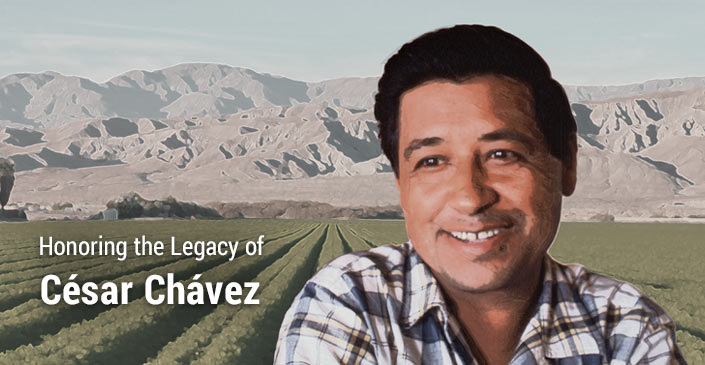Celebrating Cesar Chavez Day
03/27/2023

On March 31 we celebrate the work and life of Mexican-American labor leader, legendary community organizer, and civil rights activist, César Chávez (1927-1993). César Chávez was a champion of farmworkers; especially those who struggled to improve their working and living conditions, struggled against economic injustice, and faced overall exploitation.
Born on March 31, 1927, in Yuma, Arizona, it was 96 years ago when Chávez's parents--his father, Librado, a small farmer and businessman, and his mother, Juana Estrada--welcomed César, one of five children, to their home. Little did they know the breadth and depth of the impact their son would have on civil rights, labor organizing, and the labor movement across the United States and across the globe.
We often hear about how circumstances often force people and families to leave everything behind to find a better life. In the late 1930s, during the Great Depression, the Chávez family experienced that very situation. The family was evicted from their land and went from sustaining themselves with a grocery store, garage, and pool hall in Arizona's North Gila Valley to “living under a tree, with just a canvas on top of us, and sometimes in the car." The family was forced to abandon everything—from livestock to family belongings to their life in Arizona. The Chávez family, along with hundreds of thousands of others migrated further west to California. It was during this time that the family became migrant farm workers. Did you know young César Chávez attended more than 36 schools before dropping out after the 8th grade? Chávez dropped out of school to help his family with agricultural labor. All these experiences laid the foundation for Chávez's life-long activism, labor leadership, and non-violent struggle for worker's rights.
Throughout his life, Chávez fought relentlessly against racial and economic discrimination. Some thought his dreams of securing migrant workers' rights and establishing fair farm labor laws was impossible. Many, however, believed in his bold vision and the power and spirit of his community and labor organizing. For example, in 1962, with union organizer Dolores Huerta, Chávez formed the National Farm Workers Association (NFWA), later known as the United Farm Workers, a union devoted to helping farmers that still exists today. Even more, the 1965 NFWA led strike against California grape growers grew into a 5-year nation-wide boycott of California grapes. Throughout his life, Chávez organized and empowered some of the country's most oppressed agricultural workers.
We work in a District that is mindful of fair wages, provides health insurance and other benefits while offering security and stability for our RCCD Community. We have strong relations with our classified school employee and faculty associations, too. And, as a community, we have benefited from fair and equitable representation by those engaged in RCCD's labor negotiations. However, let us not forget that thousands of workers--of all ages--in the Inland region and across the United States, struggle against unfair labor practices, fight for fair wages, and experience labor exploitation.
As a community, let's honor Chávez's legacy by providing high-quality higher education accessible to everyone, in addition to supporting people, organizations, and labor laws that benefit all workers. Let's stand up for economic justice, win the fight against poverty, and support and defend civil rights.
Published by External Relations & Strategic Communications

